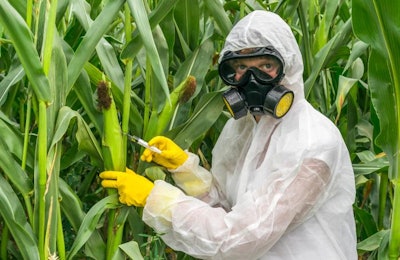
There’s plenty of valid things to be scared of in life, so why do people deserve to be scared of what they eat?
In late January 2017, the International Production & Processing Expo in Atlanta will be screening a documentary – “Food Evolution” – which I recently watched as part of a North American Meat Institute conference. The film, released in 2016, sets out to get to the bottom of the divisive and murky question of whether genetically modified organisms (GMOs) are good or bad for humanity. Spoiler alert: It concludes GMOs are safe and a positive for a world with more hunger and less resources.
While the GMO issue doesn’t exactly affect the poultry and meat industries, the film is worth seeing because it focuses on a familiar theme: fear-based food marketing tactics.
“Food Evolution” looks into the origins of GMO anxiety and finds a handful of loud, media-savvy actors are responsible for most of the anti-GMO noise. These actors may not be backed up by solid science and evidence, but they are skilled story tellers and they do a great job of scaring people by saying GMOs are bad for you.
It’s easier, it seems, to scare people than it is to educate them. Moreover, fear-based tactics work. Fear is a primal, human emotion that can trump reason and logic. A key anti-GMO tactic, the film explains, targets mothers concerned about feeding their children the healthiest food. Their message is simple: If you feed your children GMO food, or if you eat GMO food during pregnancy, you are a bad parent. No one wants to harm their children, so they steer clear of GMOs out of an abundance of caution.
Parallels to the chicken industry can be seen in the antibiotic-free, no-antibiotics-ever and organic meat movements. Like the anti-GMO crowd, these movements capitalize on fears that something scary is lurking in the meat: Antibiotics growing superbugs in your body or chemicals and pesticides slowly poisoning you.
The industry arguably pours gas on the fire with its widely used label claims like “all-natural,” “hormone-free” or “steroid-free.” These labels can, and do, make a reasonable, curious consumer think there is some synthetic, hormone and steroid-laden chicken product out there.
If it sells, more power to the marketing team and the label claim. However, the industry should be cognizant of how these seemingly innocuous claims affect consumer perception surrounding meat’s role in a healthy diet. I applaud Sanderson Farms Inc. in particular for sticking to its guns and continuing a pointed, humorous marketing campaign against this type of label claim.
The better tactic, going forward is to talk about what’s in the meat and why it’s healthy. People ultimately want to feed themselves and their families the best product at the best price. Sell chicken based on what’s in it instead of what’s not in it.


















